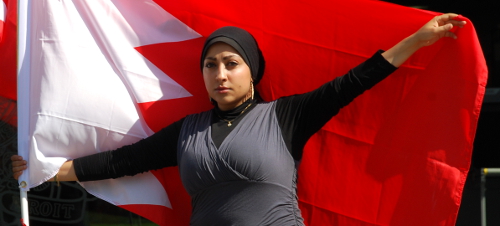UK military relationship & arms supplies
The UK is a steady supplier of arms, equipment and training to Bahrain. The government has in the past listed Bahrain as a ‘core’ market for arms sales, despite its human rights record
UK arms export licences were temporarily withdrawn during the repression of 2011 after huge public outcry, but business soon returned to normal. The UK government continues to license the sale of weaponry used in repression. For example, from 2012 to 2024, the UK approved £252 million in military export licenses to Bahrain. The most recent licenses to be approved in 2024 and 2025 were for components for military support aircraft, gun silencers, aircraft cannons, “sporting guns”, and explosives, among other equipment.
In recent years the UK has renewed its military involvement in the Gulf, involving a permanent new military and security presence in the region. In this context, the UK’s defence relationship with Bahrain continues to be strong. In 2024, the UK joined the US-Bahrain Comprehensive Security Integration and Prosperity Agreement (C-SIPA). Bahrain has hosted the UK Naval Support Facility since 2018; it is the main facility for UK vessels in the region. In February 2025, the country’s national security advisor met the UK’s chief of defense staff in London where they discussed maritime and air alliances and aerial defence collaboration. The countries’ ties go beyond the defence sector. In June 2025, not only did the two countries agree a new Defense Cooperation Accord, the Labour government agreed a UK£ 2 billion investment plan by Bahrain’s private sector in key UK sectors including financial services, technology, manufacturing and decarbonisation.
The UK government has also provided training to Bahraini military and internal security forces. Bahrain’s policing has been informed by British police advisors. For example, the UK’s College of Policing obtained a contract from the Bahrain’s Ministry of Interior to train police officers in 2015.
Bahrain also hosts arms fairs where UK companies exhibit. A UK company, Clarion events, which organises the infamous DSEI arms fair in London organised an arms fair in Bahrain in 2017, the Bahrain International Defence Exhibition and Conference (BIDEC). A coalition of NGOs including CAAT called on arms companies to boycott the fair; these included BAE Systems, Lockheed Martin, Defence Equipment Sales Authority (DESA), Bell Helicopter and AeroVironment, none of which responded to the Business and Human Rights Resource Centre’s request for comment about the call to boycott. The fair has since been repeated in 2019. Bahrain also hosts the Bahrain International Air Show (BIAS) annually; UK military aerospace giants BAE Systems regularly attends alongside, for example, its peers Lockheed Martin (US), Airbus (France) and Rosoboronexport (Russia). Delegations from Bahrain frequently attend UK-based arms fairs including Security and Policing, and DSEI.
A notable sale of UK military equipment to Bahrain was of a BAE-manufactured former Royal Navy patrol vessel, sold second-hand to the Bahraini navy in 2020. BAE Systems also unsuccessfully attempted to sell Eurofighter Typhoon jets to Bahrain in 2013. Other major recipients of UK export licenses to Bahrain since 2008 include: Sparecraft, which makes airplane parts, the Herstal group, which makes small arms and ammunition, and Accuracy International, which sells precision rifles.
The diplomatic, military and commercial links between the UK and Bahrain have created an environment where the UK government offers essentially uncritical support for the repressive Bahraini regime.
Bahrain’s allies have opted for a disastrous policy of appeasement and acquiescence, and they have remained largely silent in the face of human rights violations that they would loudly denounce were they taking place in a less strategically important country.
Nicholas McGeehan, Human Rights Watch, September 2014


